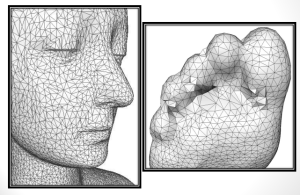Entrance Announcement
MICTE 2080
2080 Magh 07
User:Subekshya Poudel/Teaching Lesson Plan 21: Difference between revisions
| (2 intermediate revisions by the same user not shown) | |||
| Line 15: | Line 15: | ||
'''No. of Students:''' | '''No. of Students:''' | ||
<br> | 17<br> | ||
</div> | </div> | ||
== Specific Objective == | == Specific Objective == | ||
| Line 32: | Line 32: | ||
== Teaching Learning Activities == | == Teaching Learning Activities == | ||
[[File:Polygon Meshes.png|thumb]] | |||
1. I will begin the class by describing about 3D object representation<br> | 1. I will begin the class by describing about 3D object representation<br> | ||
2. Then categorize 3D object representation into 2 parts: Boundary representations and Space–partitioning representations and discuss about them.<br> | 2. Then categorize 3D object representation into 2 parts: Boundary representations and Space–partitioning representations and discuss about them.<br> | ||
| Line 50: | Line 50: | ||
== Assessment == | == Assessment == | ||
1. | 1. What is polygon surfaces? Illustrate the polygon table with example. | ||
2. What is polygon meshes? Explain with its advantages and disadvantages. | |||
Latest revision as of 08:48, 15 May 2024
Subject : Computer Graphics
Period: Fourth
Topic: Three Dimensional Graphics
Teaching Item: 3D object representation: Polygon table
Level: Bachelor 6th sem
Unit: Five
Time: 50 min
No. of Students:
17
Specific Objective
At the end of this lesson students will be able to:
- understand the concept of polygon surface
- learn about the structure and organization of polygon tables.
- understand about polygon meshes with its advantage and disadvantage
Teaching Materials
- Laptop
- Presentation slide
- Projector
- Whiteboard and marker
Teaching Learning Activities

1. I will begin the class by describing about 3D object representation
2. Then categorize 3D object representation into 2 parts: Boundary representations and Space–partitioning representations and discuss about them.
3. I will draw three figures in the whiteboard(triangle, rectangle, hexagon) and ask students what common thing did you find in those figures.
4. Some students will answer the line segment is common.
5. Ask students about what they know about polygons.
6. By showing the figures from whiteboard I will define the polygon is a plane figure that is made up of straight line segments connected to form a closed shape.
7. Describe about polygon surfaces.
8. Discuss the importance of polygon tables in 3D graphics and rendering.
9. Introduce three table that polygon tables consist of: vertex table, edge table, and surface table.
10. Present how vertex table, edge table and surface table are created from whiteboard.
11. Discuss about polygon meshes with its advantages and disadvantages.
12. Show the figure of polygon meshes from projector.
13. Discuss the equation for plane surface: Ax + By + Cz + D = 0 using the coordinate values.
14. Ask students if there is any confusion on today's topic and provide guidance and assistance if needed.
Assessment
1. What is polygon surfaces? Illustrate the polygon table with example.
2. What is polygon meshes? Explain with its advantages and disadvantages.